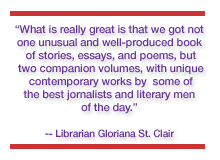|
|
||||
|
|
University Libraries Acquires One-Millionth Book University Libraries is on a roll of milestones associated with the number 1,000,000. In 2001, the university celebrated having made one million pages of archival material available to scholars on the Web. Included in the million pages are the H. John Heinz III Archive, the Allen Newell Collection and the Herbert A. Simon Collection. One million digitized books, free for all to read on the Web, is the goal of the Million Books Project (MBP), an international partnership between Carnegie Mellon and institutions in India and China. The MBP, which began in 2001, will be completed in about five years. The third "one-million milestone" was the recent acquisition of the school's one-millionth library book. The symbolic volume is Liber Scriptorum, The First and Second Books of the Authors Club of New York (1893 and 1921), a pair of limited volume editions. These copies of Liber Scriptorum ("book of writers") were part of the Carnegie family library at Skibo Castle in Scotland, and are a gift to the university from the Carnegie UK Trust on behalf of Carnegie heirs. Dame Gillian Wagner, trustee and former chair of the Trust, presented Liber Scriptorum to President Jared L. Cohon in a ceremony at the Andrew Carnegie Society Breakfast during Homecoming Weekend, Saturday, Oct. 5. The books, available in full text on the Web, will reside in Hunt Library's Fine and Rare Book Room.
University Librarian Gloriana St. Clair said Liber Scriptorum was acquired through the efforts of the University Libraries Development Board, most notably Trustee Lucian Caste (A'50) and his wife Rita Ebner Caste, an honorary alumna of the university. "I knew we had to have a very special book for this occasion, so I consulted with the Libraries Development Board for ideas, and chairman Tod Hunt Jr. suggested we try to use Lucian and Rita Caste's connections with the Carnegie family to discover the perfect book," St. Clair explained. St. Clair said the Castes visited Great Britain this past spring and talked about the search with Andrew Carnegie's great-grandson, William Thomson, chair of the Carnegie UK Trust. Thomson recommended Liber Scriptorum from the family library, suggested the gift idea to the Trust and obtained approval. "What is really great is that we got not one unusual and well-produced book of stories, essays and poems, but two companion volumes, with unique contemporary works by some of the best journalists and literary men of the day, including Samuel Clemens, William Dean Howells and Henry Harland," St. Clair said. The Authors Club of New York, organized in 1882, was a social club for like-minded men and a support group for younger writers. In 1891, club members conceived Liber Scriptorum as a means to raise money for a suitable permanent home. Each member contributed an original essay, story or poem that would never be published elsewhere. Each author signed 251 copies of his entry, and the books were then bound.
When Carnegie first attempted to join the club and submitted a book for review, a club member said words to the effect that "No Pittsburgh ironmaster ever wrote this. Why, this book shows that he has a style." Carnegie was immensely gratified by this criticism. He became a member May 20, 1886. Carnegie contributed an essay on poet Robert Burns, "Genius Illustrated from Burns," published in The First Book.
Liber Scriptorum is on the Web at: NSF Aids Million Books Project The National Science Foundation's Information Technology Research Program has also awarded a $3 million, three-year grant to the Million Books Project (MBP) to support digitization of core academic materials, technical reports, government documents and cultural treasures. The project involves partners at Carnegie Mellon, Carnegie Library of Pittsburgh, Indiana University, National Agriculture Library, OCLC, Penn State University, Stanford University, University of California-Berkeley, University of Washington, and 17 institutions in China and India. Principal investigators are Raj Reddy, the Herbert A. Simon University Professor of Computer Science and Robotics, and university librarian Gloriana St. Clair. The MBP will create a large testbed of academic resources of all types, in many languages, and make these materials available free for all to read on the Internet. The project is expected to be completed by 2007. Related Links: University Libraries (http://www.library.cmu.edu/)
Million Books Project
University Libraries the First to Digitize One Million Pages
"Genius Illustrated from Burns," essay by Andrew Carnegie, from Liber Scriptorum, The First Book (1893)
"A Captain of Industry," eulogy for Andrew Carnegie, written by William J. Holand, from Liber Scriptorum, The Second Book (1921)
Cindy Carroll
|
||
|
Carnegie Mellon Home |
||||

 Many members of the Authors Club were editors. Others had more peripheral writing occupations, such as diplomat John Hay and professor Felix Adler. Some members were great storytellers, like Samuel Clemens and Frank Stockton.
Many members of the Authors Club were editors. Others had more peripheral writing occupations, such as diplomat John Hay and professor Felix Adler. Some members were great storytellers, like Samuel Clemens and Frank Stockton.